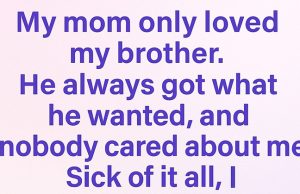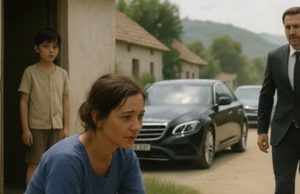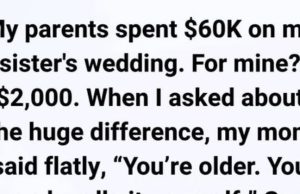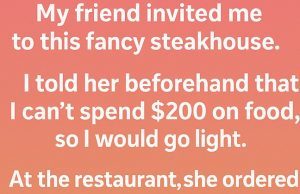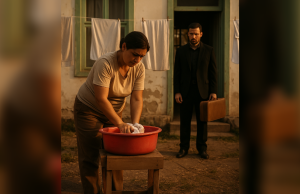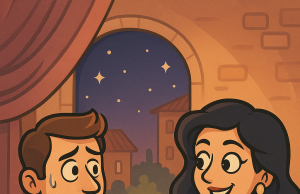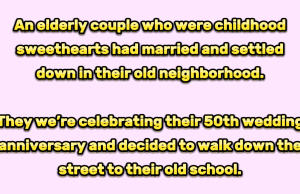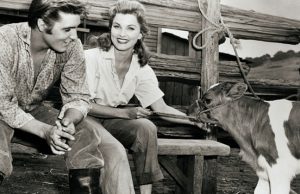The Unsent Letters
One winter morning, thick fog blanketed the rooftops of suburban Lyon. Madame Lucille sat by the window, knitting with distracted hands while her eyes drifted over the frost-covered garden. Beside her was a small, worn wooden box — containing letters never sent.

She had lived a “stable” life — a kind husband, two successful children, a cozy home. But only she knew a part of her heart had long been sealed inside that box, where she kept her unsent letters to a man named Adrian.
Adrian had been a former colleague, someone who made her heart feel alive again — back when she was 42, her marriage quietly cold, her children rebellious teens, and she herself a silent shadow in her own life.
Nothing had happened — just long conversations, glances held a second too long, and once, the brush of his hand as he handed her a coffee. She wrote him letters, many, but never sent them. Out of fear. And out of love — because love, placed in the wrong moment, could be a cruel thing.
Adrian left the company later that year, moving to Italy without a word. She packed the letters into a wooden box, buried them in a drawer, and returned to her role as mother and wife. No one ever knew. But sometimes, on quiet winter mornings like this, she would sit still for hours, remembering his deep voice, and wondering:
“If I had sent just one letter… would life have been different?”
The clock ticked gently. She put down her knitting, opened the box, and pulled out a letter — its paper yellowed with time. She read it slowly, then for the first time, smiled through silent tears.
“Adrian,
If you’re reading this, maybe we would have had a different old age…”
The Nameless Sender
Two weeks after that winter morning, Madame Lucille received a letter.
No stamp. No return address. Only her name in careful black ink:
“To Madame Lucille G.”
Her heart stopped at the first line:
“I once kept a letter from you, years ago. Slipped inside a book. I didn’t read it right away. Maybe I was afraid…”
Her hands trembled. Her breath quickened. Her mind raced back to 1996 — the year Adrian disappeared without a word.
“I found it three months ago, while clearing out an old shelf in Milan. When I finally read it, I went quiet for a long time. That letter made me feel older — and yet, somehow, alive again.”
She folded the letter halfway. She didn’t need to read more. She knew — it was Adrian.
In the kitchen, she boiled water and poured chamomile tea. Holding the letter like something sacred, she returned to her chair by the window, where the soft winter light filtered in through gray skies.
“Lucille, I loved you. In the way a man loves when he knows he has no right to. Maybe I was a coward — but I didn’t want to disrupt your life. I thought if I left, it would be easier for you to return to being the strong wife and mother everyone expected. But now I wonder — what did I take from your heart?”
“If I knock at your door today, will you open it?”
That final question hit her like a gust of wind. For a moment, the world went silent — the ticking clock, the distant birds, even her own breath.
The answer wasn’t easy.
She had lived a peaceful life for over thirty years — but perhaps that peace had been a kind of hiding.
She folded the letter gently, placed it beside her tea, then rose to get her coat. The cold wind touched her cheeks, but her eyes held a new light — one she had thought long extinguished.
She didn’t know if Adrian would really knock. But this time, if the doorbell rang…
She would open it.
Wind at the Door
Saturday afternoon. A soft drizzle blanketed the city. Raindrops tapped on the wooden awning like a quiet lullaby.
Madame Lucille was arranging flowers in a white ceramic vase — a new habit since the letter. She placed sprigs of lavender carefully, to fill both her home and the quiet corners of her soul.
The doorbell rang.
She didn’t panic. She didn’t rush. Only her heartbeat dropped slightly.
Wiping her hands on her apron, she walked to the door and opened it. And time… seemed to pause.
Adrian stood there — tall, his hair now mostly silver, but his eyes unmistakable. Still calm, still deep — but now holding a softness, the kind that comes only from having lost and learned to live with it.
“Hello, Lucille,” he said, barely above a whisper.
She said nothing for a few seconds. Just looked at him. Then a slow, deep smile — the kind you give someone returning from a long exile in your memory.
“Come in,” she said quietly.
They sat across from each other in her small living room. She poured tea. He looked around — not much had changed: same old rugs, same framed photos, same light filtering through the old lace curtains.
“I wasn’t sure you’d want to see me,” Adrian said, his eyes fixed on the tea.
“I wasn’t sure either… until I read your letter,” she replied, without bitterness.
Silence followed. A silence not heavy, but full — like freshly tilled soil waiting to breathe.
“I stood at your door once,” he said finally. “Back then. But I couldn’t ring the bell.”
“I know,” she whispered. “I heard the footsteps.”
He looked up, startled. “You…?”
She nodded. “But I didn’t dare open either.”
A long breath — maybe from him, maybe from both.
“Adrian,” she said, “What did you mean by: ‘If I knock, will you open’?”
“That… I wanted to try, just once, to be brave. Even if late.”
She looked at him for a long time. “So did I.”
Outside, the rain had stopped. The sun broke through the clouds, casting a soft gold through the window. On the table, the tea was still warm. In their hearts, two people who had once missed each other were learning how to be present.
No one spoke of “what if.” No one said “if only.”
Just one final question:
“Are you in a hurry?” Lucille asked.
Adrian smiled gently. “Not this time.”
A Door Opened Late
Spring returned to Lyon with the soft scent of cherry blossoms and morning birdsong. The cobbled streets grew lively, but in Madame Lucille’s home, everything remained calm — except now, there were two cups of tea each morning.
Adrian had moved nearby, into a small flat just two buildings away. There were no grand declarations, no second wedding. Just quiet presence: morning markets, afternoon books, evening talks by the window.
One April day, Lucille’s granddaughter Clémence visited from Paris. She was surprised to see an unfamiliar man trimming the garden, holding the same porcelain cup her grandmother always used.
“Who’s that?” she asked.
Lucille smiled, no need for lengthy explanations. “An old friend… who found his way back.”
Clémence didn’t fully understand, but she noticed something: her grandmother’s eyes had changed — no longer the quiet woman in old photographs, but someone who was truly living again.
At the end of spring, as lavender bloomed in the garden, Lucille sat to write a new letter. Not to Adrian this time — but to herself.
“Dear Lucille,
Thank you for not keeping your heart closed too long. Thank you for opening it, even late. Not to relive the past — but to finish the story with the gentleness you always deserved.
Growing old is not an ending. It’s the silence where you can finally hear your heart most clearly. And sometimes, in that silence, new doors open — not grand, not loud, but true and enough.”
Message to the reader:
“Love doesn’t always arrive on time. But the heart always knows the way back — if we dare to open the door.”
For those living with unspoken feelings — know this: late is still better than never.

